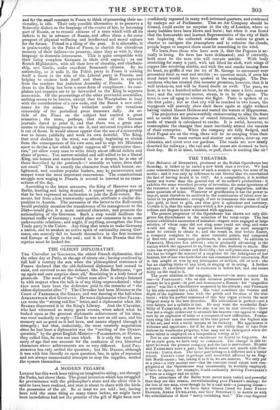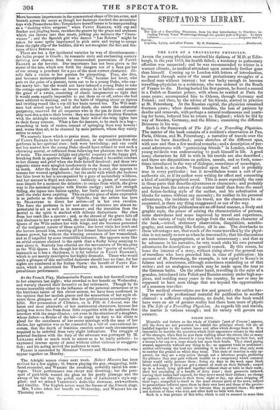THE THEATRES.
THE Belisario of DONIZETTI, produced at the Italian Operahouse last Saturday, is rather to be called a new birth than a revival. We had some remembrance of the name ef such a modern opera, but none of its merits ; and it was only by reference to our libretti that we ascertained the fact of having heard it in 1837. As a composition, it is neither better nor worse than the general run of its author's productions : it exhibits the same wretched poverty of invention, the same ignorance of the resources of a musician, the same amount of plagiarism, and the same quantum of noise. Whatever of gratification it has the power to impart, must therefore be ascribed to the combination of talent now in- listed in its performance; enough, if not to transmute this mass of lead into gold, at least to gild, and thus give it splendour and currency. Certain it is, that the same opera which a few years since produced only tedium and disgust is now welcomed with applause. The present proprietor of the Operahouse has shown not only dili- gence but discernment in the selection of his vocal corps. The last season exhibited a succession of mistakes: singers were engaged at large salaries, of whom some did not sing, some could not sing, and some would not sing. He has acquired knowledge as most managers must be content to obtain it ; and the result is, that before Easter, a company complete in the most essential points, and composed of first-rate and competent performers, is assembled. In addition to lazitsram, MOLTINI has arrived ; who is gradually advancing to the station which she appeared to us, from the first, destined to attain. Her voice has acquired volume and flexibility; her self-possession is greater ; she has no longer the manner of a suppliant for the indulgence of her hearers, but of one who feels that she can command their admiration. Nor is this sought or won by any stratagems or devices, old or new : she has no claptrap tricks of any kind, in singing or in acting. A further advance in excellence and in eminence is before her, and she seems fairly on the road to it. The great addition to the company, however—in more senses than one—is FORNASARI; who on this occasion personated the hero. In. statare he is a giant—in port and demeanour a Roman : his "magnifico c,arro " was like a wheelbarrow measured by his altitude ; and PERSIAN/ by his side seemed but a child. His voice combines the volume and depth of the legitimate bass with the polish and freedom of the true tenor ; while his perfect command of this fine organ evinces the most diligent study in the best direction. His articulation is perfect—not a note falters, not a syllable is lost. He may want the wonderful flexi- bility of TADIBURINI, at least his aim was not in that direction : there was not a single endeavour to astonish his hearers—no appeal to vulgar ears by an explosion of noise or a conquest of new difficulties. FortNA- sear sang like a man conscious of the true power and the highest aim of his art, and with a noble disdain of its trickery. His appearance is welcome and opportune ; for if he have the ability thus to take from dulness its wearisome property, what may not be anticipated when the same talent is employed on a composition worthy of it? Nor in our enumeration of excellence let CONTI be forgotten. As far as style goes, we have only to commend. The change in this re- spect between the present company and the last is marvellous. RUBIN/ and Taaatuatxr were a pair; but Rostra would not match with Fox- NASARI : CONTI does. The latter pair belong to a different and a better school. CONTI'S voice is perhaps still somewhat affected by an Eng- lish North-easter ; but, taking it as it is, we are content. We only put in a plea—a very modest one—that the eminent vocal talent now con- gregated at the Operahouse may occasionally be worthily employed. Uberto in Agnese, for example, would eminently develop FoaxAseals powers as a singer and an actor.
The attractions of the Ballet were never more varied and powerful
than they are this season, notwithstanding poor Pzancrr's mishap: for the loss of one man, even though he be a dual unit—a jumping Janus— is scarcely felt when we have three Graces (need we name FANNY ELSSLER, ADELE DIIMILA.TRE, and GUY STEPHAN ?) to dazzle US with the scintillations of their "many-twinkling feet." The rosy-fingered Morn becomes impersonate in the symmetrical shape of DUNILATRE, and bounds across the scene as though her footsteps touched the mountain- tops with Promethean fire; Terpsichore herself seems to be masquerading as a "dashing white sergeant" when FANNY ELSSLER, with cap and Leather and jingling boots, ravishes the gazers by the grace and archness which she throws into that smart, jerking pas ntilitaire the " Craco- vienne " ; and the Spanish girl who dances "Las Boleras " might be taken for some sprite imprisoned in pink satin and trying to escape from the tight clip of the boddice, did we not recognize the feet and fea- tures of GUY STEPHAN.
These are but a few incidental varieties by way of divertissements : the ballet proper is Giselle; its romantic story and enchanting scenery deriving new charms from the transcendent pantomime of FANNY EL.SSLER as the heroine. Due importance has not been given to the moral of the tale, which sets forth the dangers not of a faux pas but of too strong a penchant for a pas of the most correct character. Gi- selle falls a victim to her passion for pirouetting. True, she dies, and becomes metamorphosed into a "Will," because her lover, who puts on the guise of a peasant, turns out to be a young Duke, who can- not marry her: but she would not have induced a young Duke to take the cottage opposite hers—as lovers always do in ballets—and assume the guise of a swain, consisting of elastic integuments so tight that it would seem equally impossible to put them on or off, unless she had been addicted to dancing, and in the habit of tripping about on tiptoes and twirling round like a top till her brain turned too. The Will mad- ness had seized upon her ; and after death, she enters the saltatorial purgatory, reserved for all coquettes who in the pas de deux of court- ship turn dos-a-dos to their lovers : they are doomed to fruitless flirtation with the midnight wanderers whom their will-o'-the-wisp lights lure to their fenny retreats. What a fate for dancers, to be stuck in a bog— crouching in beds of rushes, instead of springing from rosy bowers ! and, worse than all, to be shunned by male partners, whom they vainly strive to retain !
We scarcely know which to praise most, the expressive pantomime of FANNY Eassi.za in her mortal condition, or the wondrous feats she performs in her spiritual state : both were bewitching ; and one could not but marvel how the young Duke should have refused to wed such a charming mortal, or refrained from following her phantom into the bed of reeds. The innocent delight and playful coquetry of the happy girl, breaking forth in sportive freaks of agility, formed a beautiful contrast to her dismay and grief when she finds herself deceived ; and these two opposite states were mingled incoherently in the frenzy that terminates in death. After the first shock of the discovery is over, she appears to resume her wonted sprightliness ; but the smile with which she beckons her false lover to her is accompanied by a gaze of melancholy wildness, and her manner is frigid and absent : suddenly a gleam of conscious- ness dispels for a moment the delusion; to escape from which, she gives way to the maniacal impulse with frantic energy ; until, her strength failing, she lapses into listless apathy, her limbs moving involuntarily until she sinks down expiring. This exquisite piece of mute expression is as pathetic as the madness of Ophelia ; but the artiste has here no SHAESPERE to direct her action—all is her own creation. The feats she performs in her new state of existence are almost su- pernatural in act as well as in manner ; and the transition from the mortal to the spirit is marked with delicate distinctness. She rises from her tomb like a spectre ; and, as the shroud of the grave falls off and discloses to her a new world, she yet thinks sadly of earth: but the Queen of the Wills endues her with wings, and she becomes possessed of the malignant nature of these spirits : her lover visits her tomb and she hovers around him, exerting all her former fascinations with super- human power, but without the winning sweetness of her womanhood, and as if impelled by some irresistible influence. She appears more like an aerial creature chained to the earth than a fleshy being essaying to soar above it. Scarcely less etherial are the movements of Dumnavan as the Will Queen : but, though her dancing is the "poetry of motion," inasmuch as it has a rhythmus, it is far inferior to FANNY ELSSLER'S, which is not merely descriptive but highly dramatic. Those who would catch a glimpse of this unrivalled danseuse should lose no time, for her nights are numbered at the Italian Opera : the benefit of FANNY ELS- BLEB, which is advertised for Thursday next, is announced as her penultimate performance.



























 Previous page
Previous page